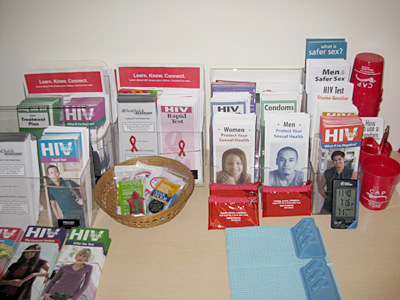Latinos More Likely To Delay HIV Treatment
CHAPEL HILL, NC - According to University of North Carolina data Latinos are more likely to start HIV care later in the course of illness than Blacks or whites,
 These findings, published in the September 1 issue of Clinical Infectious Diseases, indicate that strategies to improve earlier HIV testing among Latinos—particularly in new settlement areas like North Carolina—are needed.
These findings, published in the September 1 issue of Clinical Infectious Diseases, indicate that strategies to improve earlier HIV testing among Latinos—particularly in new settlement areas like North Carolina—are needed.
Latinos have become the largest immigrant group in the United States and now represent the fastest grouping minority group, making up one sixth of the U.S. population. While immigration from Latin-American countries is hardly new, many Latinos are bypassing border states, such as California, Arizona or Texas, and major metropolitan areas, such as New York and Chicago, for smaller cities and towns in the Midwest and the Southeast, where expanding economic opportunities await.
Between 1990 and 2000, the Mexican immigrant population in the Southern states grew more than 300 percent, according to a 2005 report released by the Pew Hispanic Center in Washington. Yet despite their growing numbers, Latinos have less education and English language proficiency and frequently lack health insurance. What’s more, many Latino immigrants are undocumented and thus further marginalized from the health care system.
These disparities are evident in the HIV/AIDS epidemic among Latinosin the United States. The U.S. Centers for Disease Control and Prevention estimates that the rate of HIV infection among Latinos is 2.5 times that of whites and that they tend to be diagnosed late, with lower CD4 cell counts, higher viral loads, more AIDS-defining opportunistic infections and longer hospital stays than whites.
Ann Dennis, MD, MS, of the University of North Carolina at Chapel Hill and her colleagues document some of the challenges in providing care for Latinos living with HIV in North Carolina, a state that has experienced a recent and rapid increase in the Latino population.
Between 1999 and 2009, 853 patients began HIV care through the University of North Carolina Center for AIDS Research Clinical Cohort. Sixty-one percent were Black, 28 percent were white, and 11 percent were Latino.
Though Latinos were clearly a small minority in the cohort, they tended to enter care with more advanced HIV infection, including presenting with an AIDS-defining condition at diagnosis. Average initial CD4 counts were lower for Latino patients (186 cells) than white patients (292 cells) and Black patients (302 cells). Latinos also accounted for 86, 75 and 50 percent of all presenting cases of active tuberculosis, histoplasmosis and toxoplasmosis, respectively.
In a statistical analysis performed by the researchers, Latinos were 1.29 times more likely to present to care late than whites or Blacks.
Interestingly, late presentation was significant only for Latino men but not for women, likely because women receive a diagnosis at the time of pregnancy.
Though the study did not document the country of origin or immigration status of the patients, an accompanying editorial by Carlos Del Rio, MD, of Emory University’s Rollins School of Public Health in Atlanta assumed that most were Mexican and undocumented.
“Also, [Dennis and her colleagues] do not tell us about the response to antiretroviral therapy among their patients, but it was likely good,” De Rio writes. “Data suggest that the clinical progression of HIV disease in Latinos is similar to that in whites once the ‘playing field is leveled,’ that is, once medical care is initiated and health care access is not a factor. In fact, they may even do better. In a recent study…undocumented Hispanics were diagnosed with more advanced HIV disease, but once diagnosed and in care, they were more likely than other populations to be retained in care, with undetectable viral loads and with a significant increase in CD4 count.”
Dennis’s team concludes that comprehensive public health programs focusing on early HIV testing and further studies to understand the barriers to use of public health resources by Latinos are needed. “While I do not disagree with them,” Del Rio comments, “I think that the interventions necessary go well beyond public health and are both political and cultural. Illegal immigration and health care are the intersection of two broken systems, and unfortunately politicians have chosen to turn a blind eye on the public health consequences of further restricting access to health care for undocumented immigrants.”










